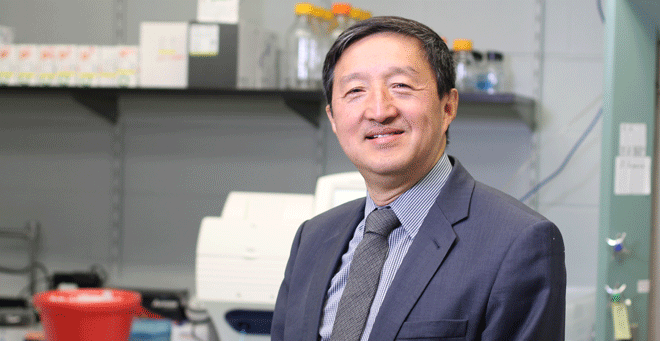 |
|
| Shan Lu, MD, PhD |
A Phase I clinical trial testing the safety of vaccines that might have the potential to prevent HIV infection will begin this month at four sites in the United States, marking the latest step in a three-decade quest at UMass Medical School to harness the power of DNA vaccines in addressing a major global health threat. The study, which is the result of research by Shan Lu, MD, PhD, professor of medicine and biochemistry & molecular pharmacology, will also monitor the vaccine’s ability to create an immune response against HIV. It is being run by the HIV Vaccine Trials Network (HVTN).
Dr. Lu has been working on the research and development of DNA vaccines—vaccines that use synthetic DNA to create HIV specific immune responses after vaccination—with support from the National Institutes of Health. The innovative vaccine design depends on using limited DNA sequences from HIV as an initial, priming immunization for the immune response, followed by a boost with a protein vaccine matching the proteins made by the DNA. To enhance the immune response, the protein vaccine is combined with the adjuvant GLA-SE, developed by IDRI. This approach will be used with one group of study participants. In a separate group of participants, the DNA and protein vaccines will be given together at the same time. The approach of using both DNA and protein vaccines, whether in a series or together, activates both antibody and cell-mediated immune responses, both of which may be needed for an effective HIV vaccine.
“We’ve made significant progress in developing a cocktail of antigens capable of producing antibodies using our prime-boost method,” said Lu, whose project to standardize and validate production of the vaccine was funded by the NIH. The prime-boost method of giving vaccines is thought to be crucial to initiating an immune response to HIV that would be able to last for years.
Beginning this month, clinical researchers at the HIV Vaccine Trials Network, headquartered at the Fred Hutchinson Cancer Research Center in Seattle, will enroll healthy volunteers at the University of Pennsylvania in Philadelphia, the University of Alabama-Birmingham, Case Western Reserve University in Cleveland and Fenway Health in Boston.
Lu believes this type of vaccine strategy, which includes a mix of proteins identified from different viral subtypes of HIV, is the most likely to stimulate broad immune responses, offering the best hope for an HIV vaccine. The vaccines being used in the trial include five DNA components and four proteins to stimulate potent and broad immune responses.
“The immune system uses B-cells to produce the antibodies that fight viral invaders,” Lu said. “The HIV DNA bits drag the B-cells out of sleep. We then expose the B-cells to specific HIV proteins, which are some of the most susceptible parts of the virus, so they can start producing antibodies that target these vulnerabilities. This prime and boost combination gives the immune system the added jolt it needs to produce antibodies to fight the virus.”
The vaccine will be tested in healthy volunteers for the safety and tolerability of the regimen, as well as immune response to the vaccines, over six to 12 months. The trial will be double blinded—neither researchers nor study volunteers will know who receives the vaccines or the placebo—until the study is completed. In fact, the study will enroll volunteers who are evaluated to be at low risk for HIV exposure, and volunteers will receive frequent HIV prevention counseling. This initial study, while an exciting step, will not evaluate whether the vaccine strategy actually protects vaccine recipients from becoming HIV infected.
In the last decade, Lu received funding under major HIV vaccine programs such as HIVRAD and IPCAVD from the National Institute of Allergy and Infectious Diseases to develop and produce an optimized HIV vaccine to be used in human clinical trials. Waisman Biomanufacturing, a contract facility affiliated with the University of Wisconsin-Madison, assisted Lu by performing manufacturing process and release assay development along with production of clinical trial materials for the current HIV vaccine regime developed by UMMS. Success from the current trial is a key step in preparing for manufacturing the vaccines for a potential large scale clinical trial.
Historically, vaccines have been tremendously successful in halting the advance of infectious diseases such as smallpox, polio, measles and yellow fever. By presenting foreign antigens to the immune system in healthy individuals, vaccines are able to stimulate production of antibodies and cells ready to fight the pathogen prior to infection. Similarly, HIV vaccines represent the best long-term hope for ending the HIV pandemic.
Relates stories on UMassMedNow:
UMMS receives $17.3 million to oversee manufacturing of HIV vaccine
Scientists get major boost in search for HIV vaccine